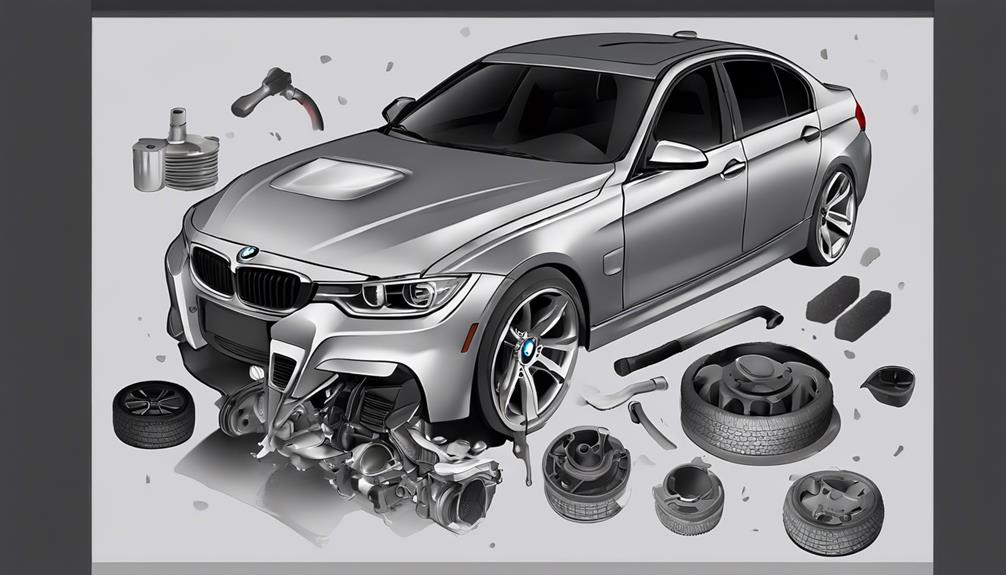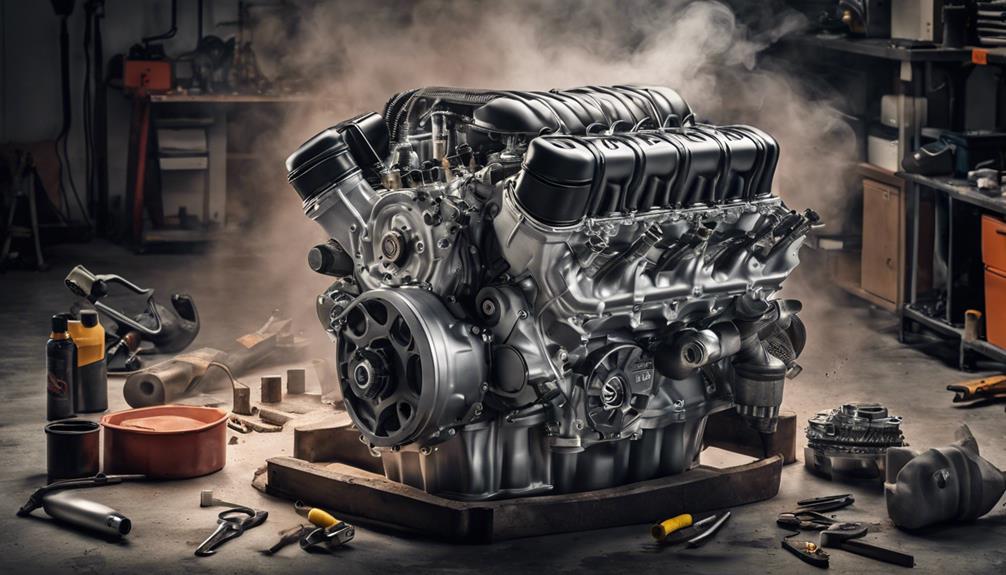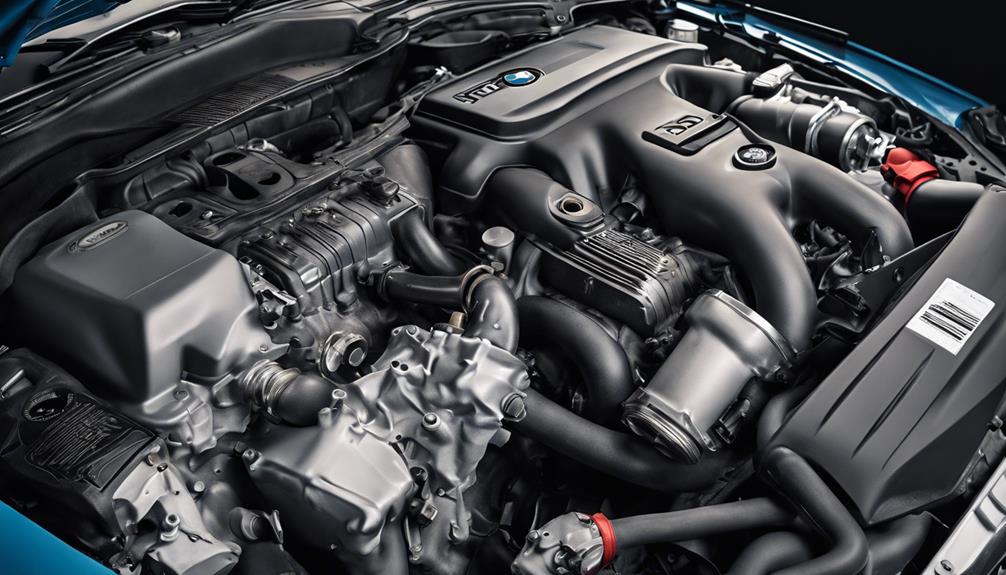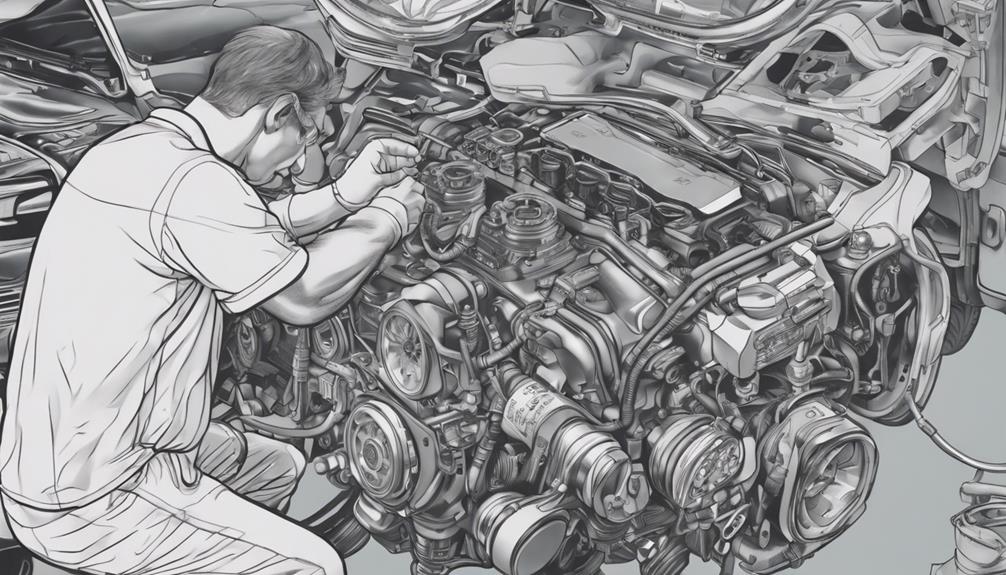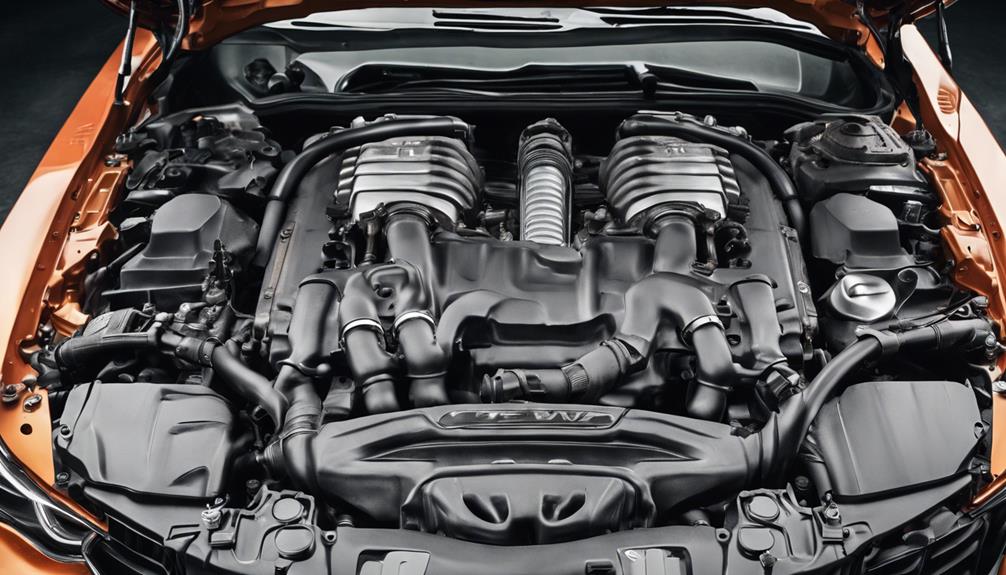When considering a BMW 335i, it's important to highlight common issues like High-Pressure Fuel Pump (HPFP) failures, Wastegate Rattle, Fuel Injector Leaks, Valve Cover/Gasket Leaks, and Water Pump Problems that can impact its performance and maintenance costs. Addressing these issues promptly can prevent further damage and guarantee a smoother ownership experience. To discover more insights into potential faults and reliability concerns of the BMW 335i, explore further details available in the research.
Key Takeaways
- High-Pressure Fuel Pump (HPFP) failures are common.
- Wastegate rattle can lead to power loss.
- Fuel injector leaks impact fuel efficiency.
- Valve cover/gasket leaks cause oil seepage.
- Water pump issues may result in overheating.
High-Pressure Fuel Pump (HPFP) Failure
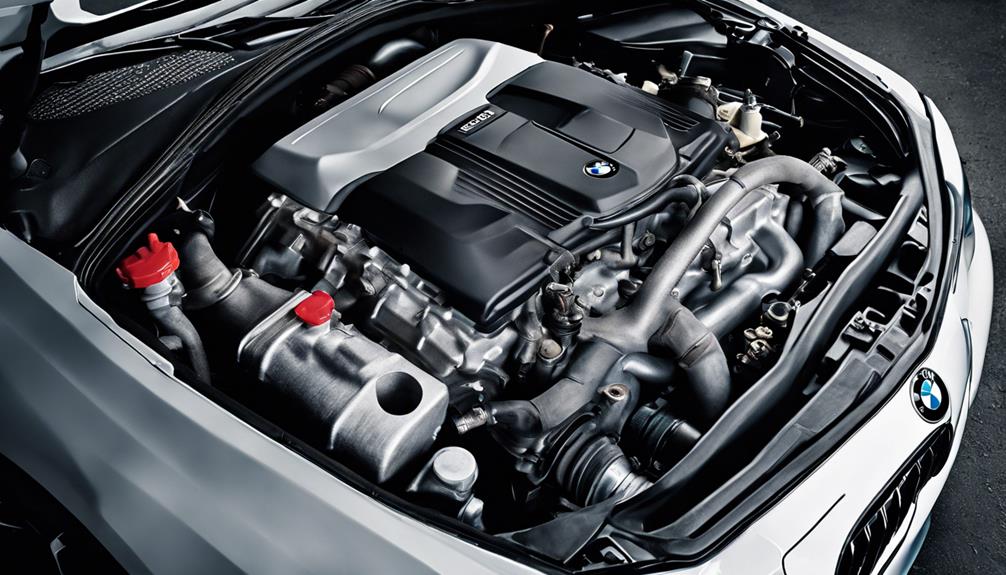
Experiencing high-pressure fuel pump (HPFP) failure in early BMW 335i models, particularly those from the 2007 and 2008 model years, is a common issue that can manifest through symptoms such as power loss, engine stalling, and illuminated check engine lights. The HPFP is a vital component responsible for delivering fuel to the engine with the necessary pressure for peak performance. However, in these early models, the HPFP can fail prematurely, leading to significant issues.
BMW acknowledged this widespread problem by issuing a recall and extending warranties for certain models affected by HPFP failures. When faced with HPFP failure, owners often encounter costly repairs, with replacements typically amounting to several hundred pounds.
To prevent the inconvenience and expense of HPFP failure, it's recommended to adhere to regular maintenance schedules and proactively monitor the fuel system. By staying vigilant and addressing any potential HPFP issues promptly, you can extend the lifespan of your BMW 335i and ensure a smoother driving experience. Remember, taking care of your high-pressure fuel pump is essential for the overall health and performance of your vehicle.
Wastegate Rattle
Wastegate rattle, a common issue in BMW 335i vehicles equipped with the N54 engine, can lead to power loss, exhaust smoke, and audible rattling noises under acceleration. This problem often arises from wear and tear on the turbocharger components, specifically the wastegate. When the wastegate rattles, it can cause the turbo to underperform, resulting in reduced power output and potential exhaust smoke. Additionally, the rattling noise can be bothersome and concerning for many BMW 335i owners.
To highlight the impact of wastegate rattle on turbo failure, consider the following table:
| Effects of Wastegate Rattle on Turbo Failure |
|---|
| Power Loss |
| Exhaust Smoke |
| Audible Rattling Noises Under Acceleration |
It's important to address wastegate rattle promptly to prevent further damage to the turbo system. BMW may provide warranties to cover the turbochargers in affected vehicles, underscoring the significance of early intervention to maintain performance and avoid costly repairs.
Fuel Injector Leaks

Addressing fuel injector leaks promptly in BMW 335i models is important to prevent engine damage and maintain peak performance. Fuel injector leaks can result in rough idling, engine misfires, and decreased fuel efficiency, impacting the overall driving experience.
If you notice symptoms like engine hesitation, stalling, or detect unusual fuel odors, it could indicate a potential fuel injector leak. To rectify this issue, timely replacement of faulty fuel injectors may be necessary.
Regular maintenance and thorough inspection of fuel injectors are vital steps in detecting and preventing leaks in BMW 335i models. By addressing fuel injector leaks promptly, you not only safeguard your engine from damage but also guarantee that your BMW 335i continues to deliver top-notch performance.
Stay vigilant for signs of fuel injector leaks to maintain the efficiency and longevity of your vehicle.
Valve Cover/Gasket Leaks
Valve cover/gasket leaks in your BMW 335i can be a common headache, particularly with the N54 engine. These leaks can result in oil seepage, potentially causing damage to your engine if left unattended.
Addressing symptoms like oil drips promptly can prevent further issues and guarantee peak engine performance.
Causes of Leaks
Experiencing leaks, particularly from the valve cover and gasket, is a common issue found in aging BMW 335i vehicles due to deteriorating gaskets and seals. These leaks can be exacerbated by the high temperatures in the engine bay, leading to cooling system problems and potential engine overheating.
When the valve cover or gasket fails, oil can seep onto the engine, resulting in burning smells and even engine damage if left unaddressed. Keep an eye out for signs such as oil spots under the car, low oil levels, and engine misfires, as these are indicators of potential leaks.
Regular maintenance, including inspections of gaskets and seals, is vital to detect and prevent valve cover/gasket leaks in your BMW 335i.
Repair and Cost
Repairing valve cover and gasket leaks in BMW 335i engines can incur costs ranging from $400 to $900, influenced by factors such as the repair location and shop rates. When facing valve cover and gasket leaks, it's imperative to address them promptly to prevent further engine damage. Here are some vital points to keep in mind:
- Seek professional assistance if you notice oil seepage or detect an oil smell in the vehicle.
- Address visible oil leaks promptly to prevent potential engine misfires.
- Compare repair quotes from different shops to make sure you're getting a fair price for the service.
- Regular maintenance and timely repairs can help maintain peak engine performance and prevent costly issues down the line.
Water Pump Problems
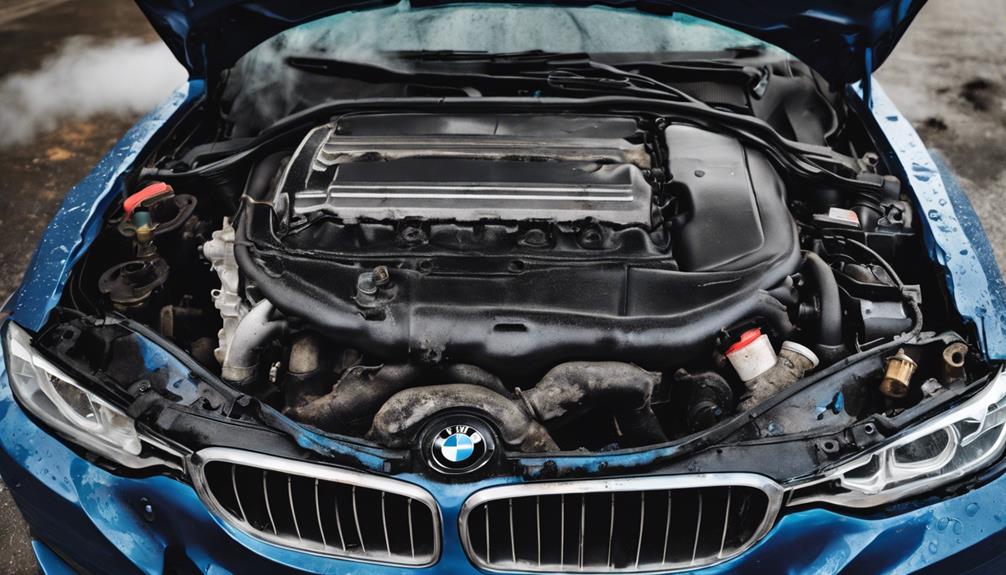
Water pump failures are a common concern plaguing BMW 335i owners, particularly those with 2007-2013 models. The water pump problems in these vehicles can result in overheating, potential engine damage, and even breakdowns. Early model years such as 2007 and 2008 seem to be more susceptible to these issues.
Replacing a faulty water pump in a BMW 335i can be a costly affair due to the intricate design of the engine. To mitigate such problems, regular maintenance and thorough inspection of the water pump are essential steps that owners can take. By staying proactive in monitoring the health of the water pump, you may be able to prevent major malfunctions and extend the lifespan of your BMW 335i.
AC Evaporator Issues
If you've come across issues with the water pump in your BMW 335i, you may also find yourself facing AC evaporator problems that can diminish cooling efficiency and introduce unpleasant odors into your vehicle cabin. Here are some key points to keep in mind:
- Symptoms: Watch out for weak airflow, unusual noises, and water leaks inside your car, as these are common signs of AC evaporator issues.
- Costly Repairs: Repairing or replacing the AC evaporator can be expensive due to the labor-intensive process required to access the component.
- Potential Consequences: Ignoring AC evaporator problems could lead to mold growth, reduced air quality, and even damage to other HVAC components.
- Preventive Measures: Regular maintenance and timely repairs can help prevent AC evaporator issues, ensuring the best performance of your BMW 335i's air conditioning system.
Being proactive about addressing AC evaporator concerns can't only maintain your vehicle's comfort but also safeguard against more significant problems down the line.
N54 Engine Reliability Concerns
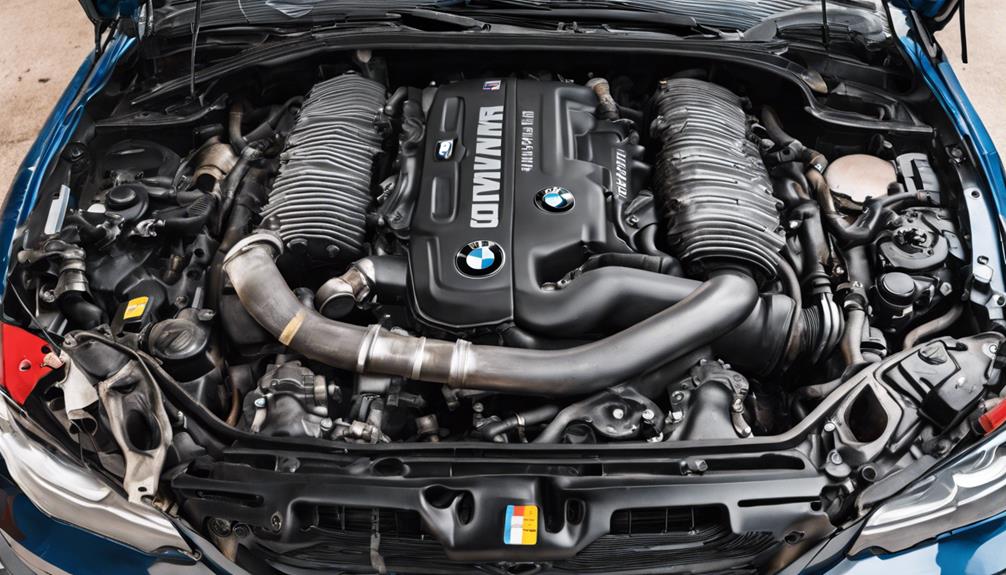
The N54 engine in your BMW 335i presents common reliability concerns that can impact its performance and longevity. Issues such as high-pressure fuel pump failures, wastegate rattle, and valve cover/gasket leaks are well-documented, potentially leading to power loss, turbocharger damage, and oil leaks.
Addressing these faults promptly is vital to maintaining the N54 engine's reliability and ensuring a smooth driving experience.
N54 Engine Problems
Amidst the myriad challenges faced by BMW 335i owners, the N54 engine stands out for its notorious reliability concerns, particularly plagued by issues like high-pressure fuel pump failures and wastegate rattles. Here are common problems with the N54 engine:
- High-pressure fuel pump (HPFP) failures impacting fuel delivery.
- Wastegate rattle leading to power loss and potential exhaust smoke.
- Fuel injector leaks affecting engine performance and fuel efficiency.
- Valve cover and gasket leaks potentially causing oil leaks and engine damage.
These issues require careful monitoring and prompt attention to prevent further damage to your BMW 335i with the N54 engine. Stay informed and proactive to maintain your vehicle's performance and longevity.
Common Faults
Mastering the common faults of the N54 engine in your BMW 335i demands sharp attention to details and proactive maintenance to uphold its performance standards. BMW 335i problems often stem from the N54 engine, with notorious issues like high-pressure fuel pump failures causing disruptions.
Wastegate rattle is another prevalent concern in the N54 engine, leading to power loss and smoke emission, affecting both performance and aesthetics. Fuel injector leaks can plague the N54 engine, impacting fuel efficiency and overall driveability. Additionally, valve cover and gasket leaks pose risks of oil leaks and potential engine complications.
AC evaporator failures are also common in the BMW 335i N54 engine, contributing to air conditioning system malfunctions. Staying vigilant to these faults is vital for maintaining the reliability of your BMW 335i.
Reliability Issues
Exploring the domain of BMW 335i reliability concerns, especially surrounding the N54 engine, poses a challenge for owners seeking uninterrupted performance. Despite its tuner-friendliness and power potential, the N54 engine has faced significant reliability issues, affecting the driving experience of BMW 335i owners.
Here are four key points to ponder regarding the N54 engine reliability concerns:
- High-pressure fuel pump (HPFP) failures are a common issue, potentially leading to stalling and rough idling.
- Wastegate rattle problems can cause power loss, engine smoke, and trigger check engine lights.
- The N54 engine's reliability issues have been a drawback for owners despite its performance capabilities.
- BMW has provided limited warranties to address some of the concerns associated with the N54 engine in the BMW 335i.
Tuning and Modification Challenges
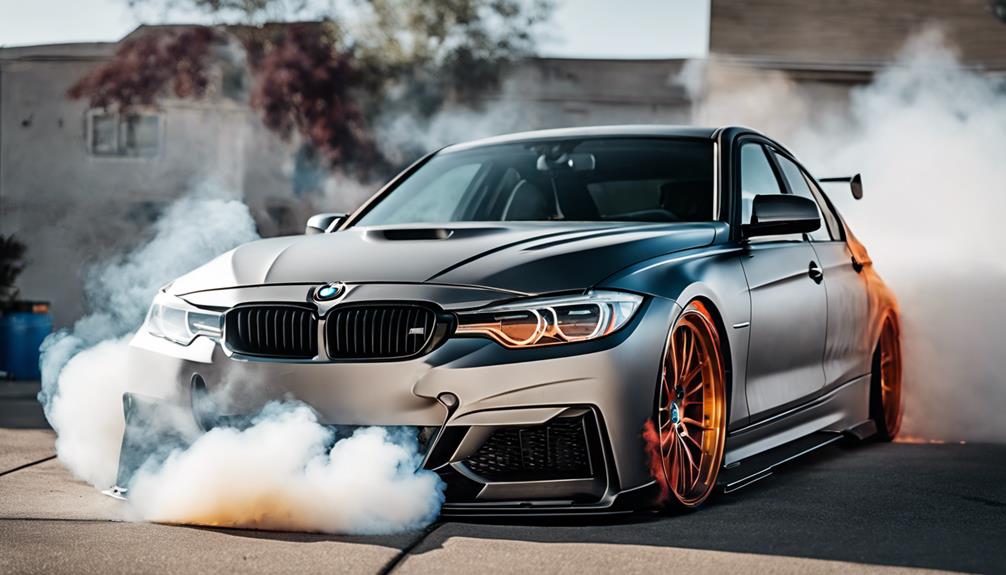
When delving into tuning and modification challenges with the BMW 335i, enthusiasts often encounter common issues such as high-pressure fuel pump failures and wastegate rattle.
The N54 engine in the BMW 335i is highly sought after by tuners due to its tuner-friendly nature and impressive power potential. Tuning challenges, like addressing high-pressure fuel pump failures and wastegate rattle, are common hurdles that enthusiasts face when seeking to enhance their 335i's performance.
The N54 engine allows for easier modifications and offers greater performance gains compared to the N55 engine, making it a popular choice for those looking to tune their vehicles. Additionally, the aftermarket support available for the BMW 335i provides enthusiasts with various tuning options to elevate the car's performance further.
With the N54 twin-turbo engine in the 335is model, there are significant opportunities for increasing power and torque output through tuning, allowing enthusiasts to personalize their driving experience to a higher level of satisfaction.
Maintenance Costs
When it comes to maintaining your BMW 335i, anticipate high repair expenses, costly parts replacement, and ongoing service charges.
The intricate engineering of the 335i can lead to complex issues that require skilled technicians and genuine BMW parts, adding to the overall maintenance costs.
Regular servicing is vital to catch potential problems early and avoid more expensive repairs down the line.
High Repair Expenses
High repair expenses for BMW 335i owners stem from the intricate engineering and premium components integrated into the vehicle, resulting in elevated maintenance costs compared to non-luxury counterparts. When it comes to owning a BMW 335i, you may find yourself facing the following challenges regarding maintenance costs:
- Complex Engineering: The sophisticated design of the BMW 335i requires specialised care, which can be costly.
- Premium Parts: The high-quality components used in the vehicle contribute to the increased repair expenses.
- Specialised Tools and Expertise: Repair shops with the necessary equipment and knowledge for BMW 335i models often charge premium rates.
- Pricier Routine Maintenance: Basic tasks like oil changes and brake replacements can be more expensive due to the luxury nature of the vehicle.
Costly Parts Replacement
You may encounter significant expenses when replacing parts for your BMW 335i due to the high costs associated with premium components like the high-pressure fuel pump and turbochargers. These costly parts are essential for the performance of your vehicle but can burden your maintenance budget.
Alongside these, items such as the serpentine belt, water pump, and fuel injectors also contribute to the overall maintenance costs for BMW 335i owners. Opting for OEM parts over aftermarket alternatives further escalates expenses as original components are pricier.
Additionally, labor costs for replacing these parts are elevated due to the intricate nature of the engine and its components. Proper maintenance and timely repairs are imperative to prevent more significant issues and even higher costs in the future.
Ongoing Service Charges
On average, the annual maintenance costs for the BMW 335i typically range between $1,000 to $1,500, encompassing essential tasks such as oil changes, brake pad replacements, and filter changes. When it comes to keeping your BMW 335i in top condition, it's important to stay on top of routine maintenance tasks to prevent any potential issues down the line.
- Scheduled Maintenance: Following the manufacturer's recommended service intervals is vital for the longevity of your BMW 335i.
- Varied Costs: Service charges can differ based on factors like model year, mileage, and driving habits.
- Preventive Measures: Regular inspections and preventive maintenance help catch problems early, potentially reducing long-term service charges.
- Performance Impact: Proper maintenance not only ensures reliability but also preserves the performance of your BMW 335i.
Known N55 Engine Issues
The N55 engine in BMW 335i models presents several common issues that owners should be aware of to maintain peak performance and prevent costly repairs.
Potential fuel injector leaks are a known problem with the N55 engine, impacting engine performance.
Valve cover and gasket leaks are also prevalent, leading to oil leaks and potential engine damage if left unchecked.
Water pump failures are another issue to watch for, as they can result in overheating and further engine complications if not promptly addressed.
Additionally, AC evaporator leaks may occur in BMW 335i models equipped with the N55 engine, causing suboptimal AC performance and potential discomfort inside the cabin.
While BMW may cover some N55 engine problems under warranty, regular maintenance is essential to avoid expensive repairs down the line.
Stay vigilant and address these common N55 engine issues promptly to keep your BMW 335i running smoothly and efficiently.
Considerations Before Buying
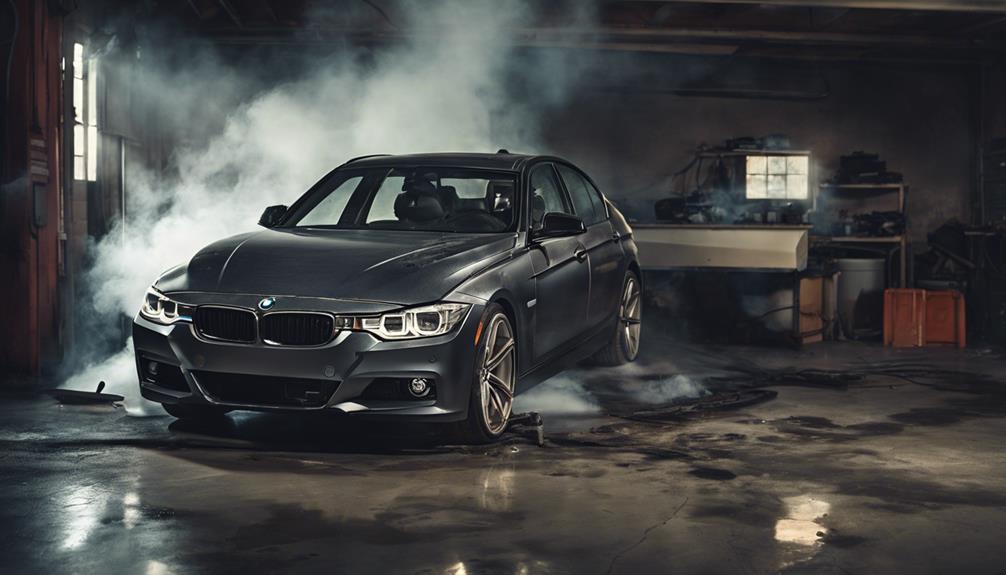
Considering the potential pitfalls associated with the N55 engine in BMW 335i models, it's crucial to carefully evaluate specific factors before finalizing your purchase decision. When contemplating buying a BMW 335i, there are several key considerations to keep in mind:
- Market Opportunities: Due to the current low demand for cars resulting from the COVID-19 situation, you might find enticing deals, especially from certified pre-owned dealers for BMW 335i models.
- Negotiation Leverage: Take advantage of the market environment by negotiating for extras such as rim and tire insurance, potentially enhancing the value of your purchase.
- Thorough Inspection: Utilize the extra time provided by social distancing measures to thoroughly inspect and work on the BMW 335i before committing to the purchase, ensuring you're aware of any potential issues.
- Financial Preparedness: Make sure you're financially prepared for owning a BMW 335i, considering the specific considerations and potential maintenance costs associated with this model.
Repair and Maintenance Tips
To ensure the peak performance and longevity of your BMW 335i, it is essential to follow a disciplined approach towards repair and maintenance. Engaging in preventive maintenance tasks can help you avoid common issues such as engine rattle, broken serpentine belts, and high-pressure fuel pump failures. Regularly checking and maintaining refrigerant levels can reduce noise and vibrations in the A/C system. Promptly addressing cooling system problems can prevent high cabin temperatures and engine overheating. Proactively dealing with engine issues like rough idling, turbo failure, and overheating can extend your BMW 335i's service life. When it comes to repairs, sourcing compatible replacement parts quickly from reputable suppliers like CarParts.com is vital for the timely maintenance of your BMW 335i.
| Preventive Maintenance Tasks | Benefits |
|---|---|
| Regular engine check-ups | Avoid engine issues |
| Monitoring refrigerant levels | Reduce A/C system noise and vibrations |
| Promptly addressing cooling system problems | Prevent overheating |
| Proactive engine issue resolution | Extend service life |
Frequently Asked Questions
Is the BMW 335i Reliable?
Yes, the BMW 335i is typically considered dependable, with proper care. Regular maintenance can guarantee a long service life for your vehicle. Remember, taking care of your BMW is crucial to its reliability.
Does BMW 335i Last Long?
You'll find that the BMW 335i has the potential for lasting long with proper care. It ranks decently in reliability among luxury midsize cars, displaying good longevity indicators. Regular maintenance can contribute to a lengthy service life.
What Year 335i Is the Best?
For the best BMW 335i year, consider 2010, 2012, 2015, or 2016 models. These years boast low complaint rates, improved reliability, and enhanced performance. They are popular choices among consumers seeking a dependable used vehicle.
Can I Daily Drive a 335i?
You can definitely daily drive a BMW 335i with ease. Its blend of comfort, performance, and luxury features offers a satisfying experience for commuting or errands. Enjoy the powerful engine, responsive handling, and upscale interior.
Conclusion
To summarize, it's essential to be mindful of the common problems that can impact the BMW 335i, such as HPFP failure, wastegate rattle, and fuel injector leaks. These issues can result in expensive repairs and maintenance, making it vital to take into account these factors before purchasing this vehicle.
By staying proactive with regular maintenance and being aware of potential issues, you can guarantee the longevity and performance of your BMW 335i.





